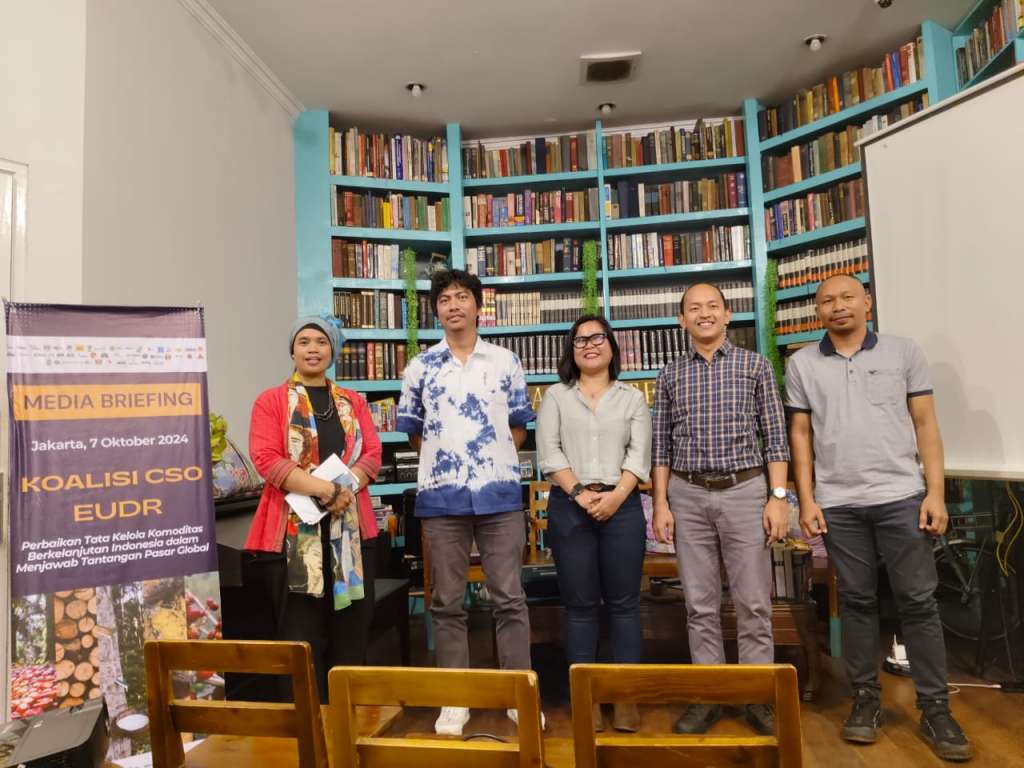
The Indonesian Civil Society Coalition, consisting of 45 organizations including NGOs, independent smallholders and plantation worker unions, Indigenous Peoples’ organizations, local communities, as well as representatives of women and youth, issues a joint statement on the importance of improving Indonesia’s commodity governance in facing increasingly stringent global market demands, particularly regarding the implementation of the European Union Deforestation-free Regulation (EUDR).
On 2 October 2024, the European Commission announced a proposal to delay the implementation of the EUDR by 12 months. The implementation, initially planned for 30 December 2024, has been postponed to 30 December 2025 for large companies and 30 June 2026 for micro and small enterprises. This delay provides additional time for Indonesia and other producing countries to adjust to the regulation.
Although this proposed delay is intended to give EU trading partner countries more time to adapt to the regulation, we express our concern regarding the proposal to delay the full implementation of this Regulation, as it may impede the progress of ongoing improvement efforts within the commodity sector.
Regardless of the potential delay in EUDR implementation, the urgency to improve commodity governance remains high, given the increasing global market demands and Indonesia’s commitment to addressing the climate crisis from the FOLU (Forest and Land Use) sector.
Indonesia, which has five commodities affected by the EUDR regulation—timber, palm oil, cocoa, coffee, and rubber—has begun taking preparatory steps to meet EUDR requirements. Therefore, we urge the Indonesian government to seize this opportunity and prioritize the following actions:
- Accelerate concrete steps to prepare for EUDR implementation: This requires strengthening sustainable forestry and commodity governance in Indonesia to ensure Indonesian products are competitive in the global market, including:
- Strengthening existing policies and schemes such as the Indonesian Sustainable Palm Oil (ISPO) and the Timber Legality and Sustainability Verification System (SVLK), ensuring their effective implementation and enforcement, and aligning them with EUDR requirements.
- Enhancing transparency and traceability across the supply chain.
- Consistent enforcement of laws against environmental and social violations.
- Grievance Mechanism: An easily accessible and effective grievance mechanism is crucial to ensure accountability.
- Paying attention to and building governance systems for less-attended commodities, such as
rubber, cocoa, and coffee, to ensure comprehensive sustainability efforts across all
commodities.
- Take full responsibility in navigating EUDR implementation: The government has the necessary resources and authority to protect the interests of its people, including smallholders, Indigenous Peoples, and other vulnerable groups. This includes:
- Strengthening coordination between ministries and agencies, and between central and regional governments to create coherent policies and effective implementation in facing global market requirements, including EUDR.
- Promoting inclusive and comprehensive implementation across all sectors through a whole of-government approach involving all relevant ministries and agencies, as well as engagement with the private sector and civil society.
- Ensuring the protection of rights and active involvement of Indigenous Peoples through the enforcement of Free, Prior, and Informed Consent (FPIC) and meaningful participation of Indigenous Peoples and local communities in natural resource management.
- Develop and implement comprehensive support programs for smallholders: These programs should prepare smallholders to meet EUDR requirements and other global market demands, including providing technical and financial assistance in fulfilling mandatory national sustainable commodity governance systems such as ISPO and SVLK.
We believe that improving commodity governance will not only help meet EUDR requirements but also:
- Enhance the competitiveness and acceptance of Indonesian commodity products in the global market, positioning Indonesia as a world leader in sustainable commodities.
- Protect the environment by reducing deforestation and forest degradation, supporting Indonesia’s efforts to achieve the FOLU net sink target by 2030.
- Improve community welfare, as sustainable practices will provide better market access for small farmers, Indigenous Peoples, and local communities.
We call on the government to demonstrate leadership and commitment to achieving these goals.
The extension of the EUDR implementation period should be used as momentum to accelerate the
necessary transformation.
We hereby issue this joint statement for your attention
Coalition Members:
- Aliansi Masyarakat Adat Nusantara (AMAN)
- Barisan Pemuda Adat Nusantara (BPAN)
- Coaction Indonesia (Koaksi Indonesia)
- Deling Kuning
- FIAN Indonesia
- Forest Watch Indonesia (FWI)
- Global Geografi Indonesia (GRID)
- Green of Borneo
- Independent Forest Monitoring Fund (IFM Fund)
- Indonesia for Global Justice (IGJ)
- Jaringan Pemantau Independen Kehutanan (JPIK)
- Jurnal Celebes
- Komunitas Masyarakat Desa – Sulawesi Tenggara (KOMNASDESA – SULTRA)
- Komunitas Teras
- Lembaga Papuana Konservasi – Manokwari, Papua Barat
- Lembaga Studi & Advokasi Masyarakat (ELSAM)
- Link-AR Borneo
- PADI Indonesia
- Pantau Gambut
- Pengurus Daerah (PD) AMAN Sorong Raya
- Perhimpunan Bantuan Hukum Keadilan dan Perdamaian (PBHKP) Sorong, Papua Barat
- Persekutuan Perempuan Adat Nusantara (Perempuan AMAN)
- Perkumpulan Alam Hijau (A-HI)
- Perkumpulan Belantara
- Perkumpulan Kaoem Telapak
- Perkumpulan HuMa
- POKJA Pesisir
- Pusat Pendidikan Lingkungan Hidup (PPLH) Mangkubumi
- Relawan Untuk Orang & Alam (ROA)
- Satya Bumi
- Sawit Watch
- Serikat Petani Kelapa Sawit (SPKS)
- The Institute for Ecosoc Rights
- Trend Asia
- Uno Itam
- Wahana Lingkungan Hidup Indonesia (WALHI)
- WALHI Papua
- Yayasan Auriga Nusantara
- Yayasan Etnika Kosmologi Katulistiwa
- Yayasan FORTASBI (Forum Petani Sawit Berkelanjutan Indonesia)
- Yayasan Kaharingan Institute
- Yayasan Peduli Nanggroe Atjeh (PeNA)
- Yayasan Pusaka Bentala Rakyat
- Yayasan Sangga Bumi Lestari (Aidenvironment Asia)
- Yayasan SETARA, Jambi



